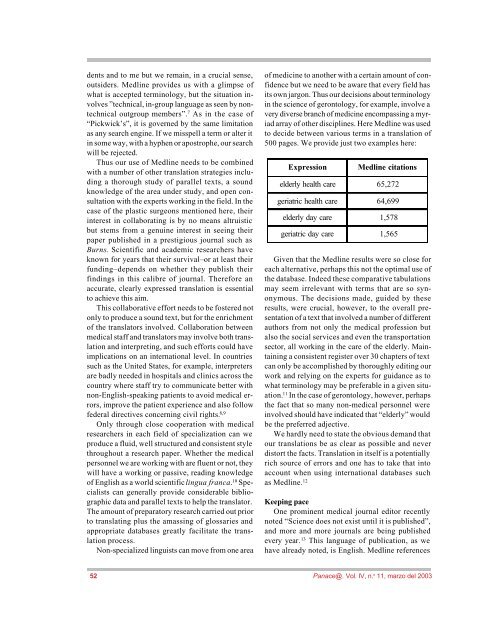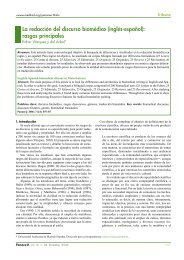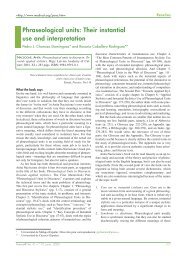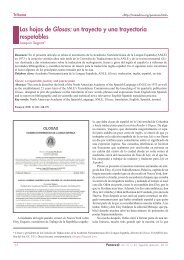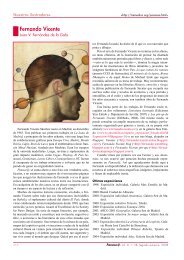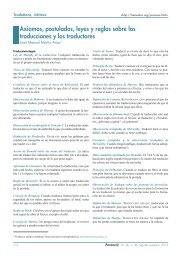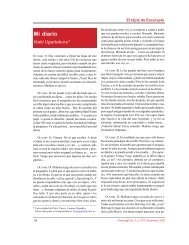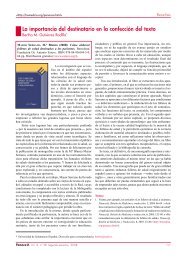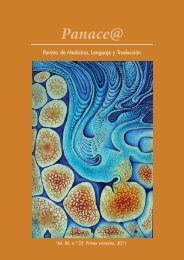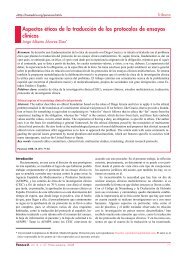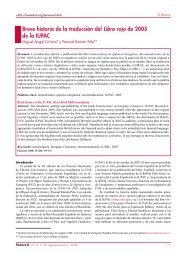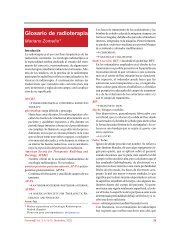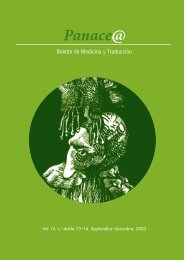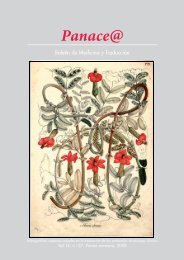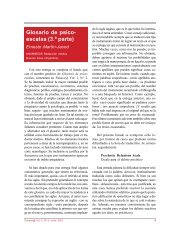BoletÃn de Medicina y Traducción
BoletÃn de Medicina y Traducción
BoletÃn de Medicina y Traducción
Create successful ePaper yourself
Turn your PDF publications into a flip-book with our unique Google optimized e-Paper software.
<strong>de</strong>nts and to me but we remain, in a crucial sense,<br />
outsi<strong>de</strong>rs. Medline provi<strong>de</strong>s us with a glimpse of<br />
what is accepted terminology, but the situation involves<br />
”technical, in-group language as seen by nontechnical<br />
outgroup members”. 7 As in the case of<br />
“Pickwick’s”, it is governed by the same limitation<br />
as any search engine. If we misspell a term or alter it<br />
in some way, with a hyphen or apostrophe, our search<br />
will be rejected.<br />
Thus our use of Medline needs to be combined<br />
with a number of other translation strategies including<br />
a thorough study of parallel texts, a sound<br />
knowledge of the area un<strong>de</strong>r study, and open consultation<br />
with the experts working in the field. In the<br />
case of the plastic surgeons mentioned here, their<br />
interest in collaborating is by no means altruistic<br />
but stems from a genuine interest in seeing their<br />
paper published in a prestigious journal such as<br />
Burns. Scientific and aca<strong>de</strong>mic researchers have<br />
known for years that their survival–or at least their<br />
funding–<strong>de</strong>pends on whether they publish their<br />
findings in this calibre of journal. Therefore an<br />
accurate, clearly expressed translation is essential<br />
to achieve this aim.<br />
This collaborative effort needs to be fostered not<br />
only to produce a sound text, but for the enrichment<br />
of the translators involved. Collaboration between<br />
medical staff and translators may involve both translation<br />
and interpreting, and such efforts could have<br />
implications on an international level. In countries<br />
such as the United States, for example, interpreters<br />
are badly nee<strong>de</strong>d in hospitals and clinics across the<br />
country where staff try to communicate better with<br />
non-English-speaking patients to avoid medical errors,<br />
improve the patient experience and also follow<br />
fe<strong>de</strong>ral directives concerning civil rights. 8,9<br />
Only through close cooperation with medical<br />
researchers in each field of specialization can we<br />
produce a fluid, well structured and consistent style<br />
throughout a research paper. Whether the medical<br />
personnel we are working with are fluent or not, they<br />
will have a working or passive, reading knowledge<br />
of English as a world scientific lingua franca. 10 Specialists<br />
can generally provi<strong>de</strong> consi<strong>de</strong>rable bibliographic<br />
data and parallel texts to help the translator.<br />
The amount of preparatory research carried out prior<br />
to translating plus the amassing of glossaries and<br />
appropriate databases greatly facilitate the translation<br />
process.<br />
Non-specialized linguists can move from one area<br />
of medicine to another with a certain amount of confi<strong>de</strong>nce<br />
but we need to be aware that every field has<br />
its own jargon. Thus our <strong>de</strong>cisions about terminology<br />
in the science of gerontology, for example, involve a<br />
very diverse branch of medicine encompassing a myriad<br />
array of other disciplines. Here Medline was used<br />
to <strong>de</strong>ci<strong>de</strong> between various terms in a translation of<br />
500 pages. We provi<strong>de</strong> just two examples here:<br />
Expression<br />
Medline citations<br />
el<strong>de</strong>rly health care 65,272<br />
geriatric health care 64,699<br />
el<strong>de</strong>rly day care 1,578<br />
geriatric day care 1,565<br />
Given that the Medline results were so close for<br />
each alternative, perhaps this not the optimal use of<br />
the database. In<strong>de</strong>ed these comparative tabulations<br />
may seem irrelevant with terms that are so synonymous.<br />
The <strong>de</strong>cisions ma<strong>de</strong>, gui<strong>de</strong>d by these<br />
results, were crucial, however, to the overall presentation<br />
of a text that involved a number of different<br />
authors from not only the medical profession but<br />
also the social services and even the transportation<br />
sector, all working in the care of the el<strong>de</strong>rly. Maintaining<br />
a consistent register over 30 chapters of text<br />
can only be accomplished by thoroughly editing our<br />
work and relying on the experts for guidance as to<br />
what terminology may be preferable in a given situation.<br />
11 In the case of gerontology, however, perhaps<br />
the fact that so many non-medical personnel were<br />
involved should have indicated that “el<strong>de</strong>rly” would<br />
be the preferred adjective.<br />
We hardly need to state the obvious <strong>de</strong>mand that<br />
our translations be as clear as possible and never<br />
distort the facts. Translation in itself is a potentially<br />
rich source of errors and one has to take that into<br />
account when using international databases such<br />
as Medline. 12<br />
Keeping pace<br />
One prominent medical journal editor recently<br />
noted “Science does not exist until it is published”,<br />
and more and more journals are being published<br />
every year. 13 This language of publication, as we<br />
have already noted, is English. Medline references<br />
52 Panace@. Vol. IV, n. o 11, marzo <strong>de</strong>l 2003


